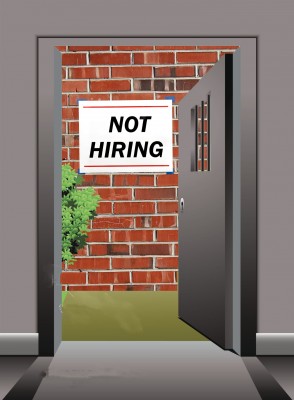 There are many challenges facing men and women as they leave prison and return to their communities. For some, there is the difficulty of simply finding a place to live. For others, there is the danger of falling into old habits and renewing old acquaintances. And for many, the lack of any kind of mentoring or support system can result into a return to criminal behavior.
There are many challenges facing men and women as they leave prison and return to their communities. For some, there is the difficulty of simply finding a place to live. For others, there is the danger of falling into old habits and renewing old acquaintances. And for many, the lack of any kind of mentoring or support system can result into a return to criminal behavior.
But perhaps the the biggest hurdle for most ex-prisoners is the challenge to find long-term employment. Without it, lodging is hard to obtain, and the pressure increases to use illegal means of support.
A recent story in the New York Times looks at some of the underlying reasons why it is so hard for former prisoners to procure jobs. A primary reason has to do with the background checks being performed by potential employers.
To be sure, employers can and should practice due diligence when hiring workers. To not do so, considering all the information that is readily available is negligent at best, and can open the employer to legal action should the new hire return to his or her criminal ways. But relying on these background checks alone can be highly prejudicial, and can serve to further a destructive cycle of behavior of which the potential hire is struggling to leave.
For starters, many of the methods used to examine potential employees are highly suspect. In some cases, databases used for running background checks might not differentiate between arrests and convictions, resulting in a much higher number of individuals being identified.
Following the terrorist attacks on September 11, 2001, a law was passed requiring that those individuals convicted of a felony within the last seven years be denied employment at American ports, which ended up excluding 59,000 people. Some 30,000 individuals filed an appeal challenging that they had been so convicted, and in nearly 25,000 cases, the Government Accountability office found the reports to be inaccurate. That at least 42 percent of those individuals identified by background checks were wrong should at least call into question the validity of some of the research methods being used.
There is also the matter of how the data collected by employers is being used. In some cases, employers only asked about certain felonies such as sexual assault or violent crimes. In other cases, any arrest served as reason to not hire a candidate. “We haven’t really figured out what a disqualifying offense should be for particular activities,” says sociologist Christopher Uggen.
In many areas of the country, aspiring employees with criminal records are still required to self-identify as such on their job applications—a practice that affords employers the chance to dismiss those applicants before the review practice even begins. In response, a number of states, counties, and municipalities have adopted “ban the box” and “fair chance” legislation, which typically requires employers to wait until the initial stages of the hiring process have been completed before initiating background examinations. However, there are typically a number of exemptions and laws vary from jurisdiction to jurisdiction.
The hurdles that ex-prisoners face in obtaining employment sometimes serve to push these men and women back into a life of crime. “You keep doing the things that get you the money because you can’t get other jobs,” Gregory Payne tells the Times. Payne has been to prison a total of four times for selling drugs. Although he says he hasn’t used or sold drugs in seven years, Payne continues to struggle to find a job. “Your record hurts you, man,” he says. “In certain cases, I understand. They got a right to say ‘no’ if you’re stealing and robbing people. I wouldn’t hire you myself. But people who went up for drugs?”
But the ex-prisoners aren’t the only ones who suffer from the increased scrutiny. With an increasing percentage of the population having spent time in prison, there has been a drain on the national workforce. The result has been higher rates of unemployment, and the lost opportunity cost of employing capable workers because of their criminal records.
“Prior to the prison boom, when convictions were restricted to a smaller fraction of the population, it wasn’t great for their rehab potential, but it wasn’t having a huge impact,” says Harvard sociology professor Devah Prager. “Now such a large fraction of the population is affected that it has really significant implications, not just for those people, but for the labor market as a whole.”
Providing ex-prisoners with support, encouragement, and opportunity gives them the best chance to become productive members of society. Prison Fellowship, with in-prison training and mentoring, provides those preparing to leave prison with the tools needed to succeed outside the prison walls. And, with the help of bridge churches, these men and women are supported and encouraged, helping them to meet their basic needs and, in some cases, find employment. To find out how you can help be a part of this transformation, visit our get involved pages.